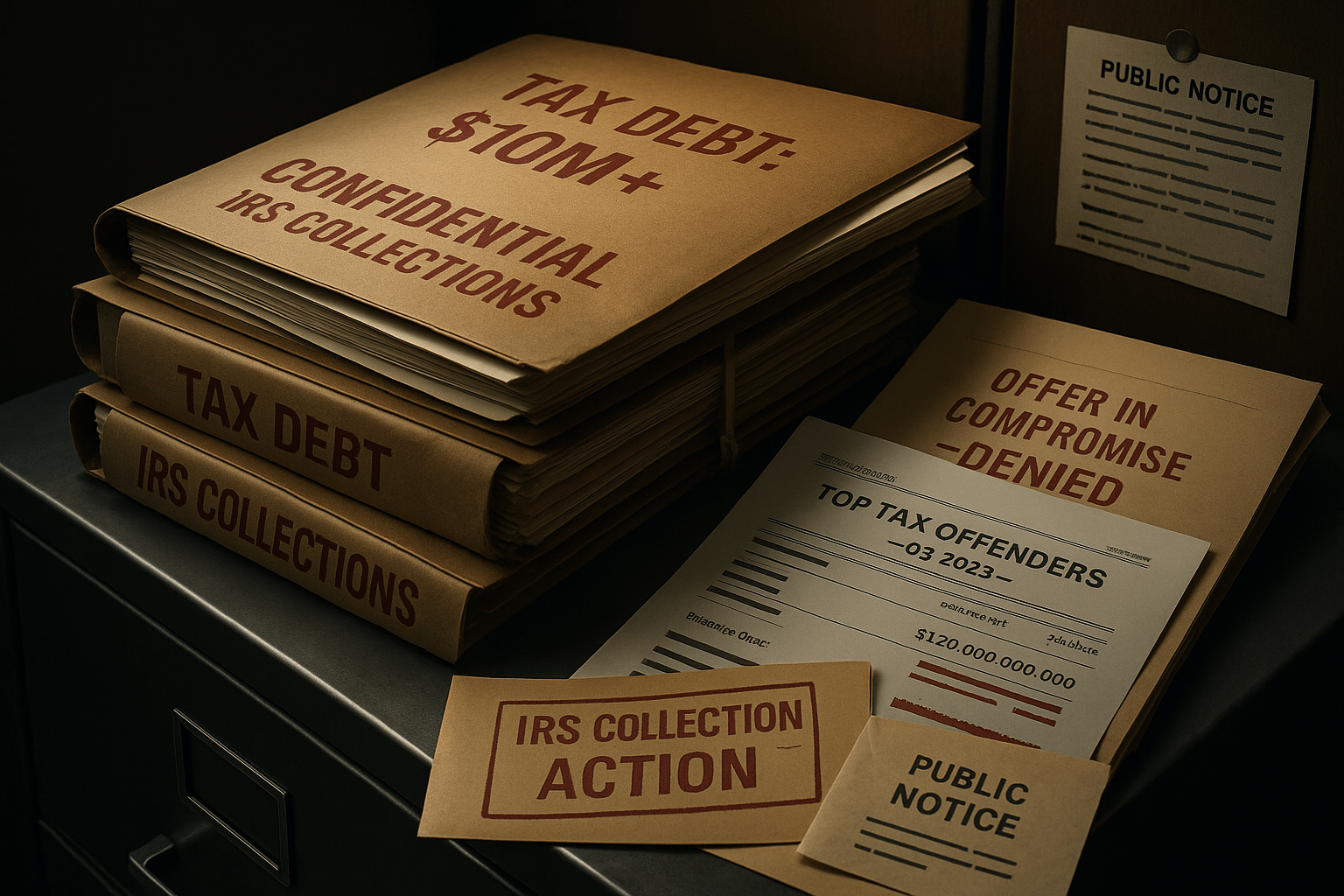
Who Owes the IRS the Most Money? Breaking Down Massive Tax Debts
Who Owes the IRS the Most Money: A Closer Look at Top Tax Offenders
Who owes the IRS the most money? This question highlights the extreme end of tax delinquency in America. The IRS maintains a list of the most delinquent taxpayers—individuals and businesses who owe millions in unpaid taxes. The IRS lists those owing $250,000 or more. Note that the total delinquent debt reflects a broad spectrum, not just extreme cases. Understanding their stories offers insight into how debt can spiral out of control.
Famous Cases: Biggest IRS Debtors in History
Some taxpayers make headlines for owing the IRS amounts so large they rival lottery jackpots. These cases are often the result of years of unpaid taxes, failed businesses, or deliberate fraud. For example, Cases like Karl Sebastian Greenwood, ordered to forfeit $300 million in a 2023 tax fraud case, show how fraud can lead to massive debts.
The Highest IRS Debts on Record
Over the years, some individuals have accumulated tax debts exceeding $100 million. Some cases involve debts exceeding $100 million, though exact figures are rare due to limited public disclosure. These cases are rare but draw national attention due to the sheer scale of the unpaid amounts.
Celebrity Tax Debts
Famous actors, athletes, and entertainers have also faced IRS collections. In many cases, poor financial management or bad advice leads to tax trouble, despite high income. For example, Wesley Snipes faced a $17 million tax debt in 2008 due to unfiled returns, highlighting the risks of neglecting tax obligations.
What Leads to Massive IRS Debt?
Enormous tax debt doesn’t appear overnight. It usually builds over time due to a mix of financial missteps, neglect, or deliberate evasion. Understanding the causes can help everyday taxpayers avoid similar pitfalls. The IRS reports that 60% of delinquent debts arise from late filings, with evasion cases like the $1 billion DC Solar fraud adding to the total.
Common Causes of Extreme Tax Debt
These are frequent causes among large debt cases, including late filings (60% of delinquencies) and unpaid payroll taxes, per IRS data.
Interest and Penalties Add Up Fast
The IRS charges both interest and failure-to-pay penalties, which can compound monthly. Interest rates are around 8% annually, with a 0.5% monthly penalty, per IRS guidelines. Read more about how these grow over time on our tax debt relief resource page.
How the IRS Handles Large Debts
The IRS treats massive tax debt seriously and has the power to pursue aggressive collection actions. Once a taxpayer hits a certain threshold, they may even be publicly named. The IRS uses liens, levies (1.1 million in FY2024), and asset seizures, publicly naming 500–600 debtors quarterly for debts over $250,000.
IRS Enforcement Actions
For large balances, the IRS can issue tax liens, freeze bank accounts(bank account levies), garnish wages, and seize assets to collect what’s owed.
Public IRS Debtor Lists
In select cases, the IRS publicly names top debtors to apply pressure and encourage payment. These lists include both individuals and businesses. The IRS names debtors owing $250,000+ in quarterly Federal Register lists to encourage payment.
Can People Really Pay Off These Debts?
Settling large tax debts is difficult, but not impossible. In FY2024, the IRS approved 34,000 OICs worth $1.2 billion, showing relief is possible for qualifying taxpayers.
Offer in Compromise (OIC) and Other Options
An Offer in Compromise allows eligible taxpayers to settle for less than the full amount owed. This is particularly useful for individuals with large liabilities but limited income or assets.OIC typically settles debts for 1–50% of the balance based on financial hardship.
When Debts Become Uncollectible
If a taxpayer cannot afford to pay and has no income or assets, the IRS may place their account in Currently Not Collectible (CNC) status. CNC status, applied to 200,000 accounts in FY2024, pauses collections, though 8% annual interest still accrues. To learn more, visit our legal help page.
Avoid Becoming a Top IRS Debtor Yourself
No one plans to become one of the top IRS debtors. Compliance, timely filing (the IRS processed 266.6 million returns in FY2024), and early action prevent debt escalation. Being proactive can prevent small issues from becoming headline-worthy problems.
Resolve Your IRS Issues Before They Grow
Worried about your tax balance? The IRS assisted 62.2 million taxpayers in FY2024, highlighting the value of expert support. You don’t need to wait for the IRS to take action. Contact us to speak with a licensed tax professional. We help taxpayers navigate collections, understand IRS procedures, and apply for forgiveness programs. Start with a free case review to see where you stand.
Frequently Asked Questions
1. Who currently owes the IRS the most money?
No single top debtor is publicly confirmed in 2025, but debts over $100 million have occurred, with the IRS updating its $250,000+ list quarterly.
2. Does the IRS always go public with large debts?
Not always, only for debts over $250,000 under specific conditions.
3. Can high-profile people get out of paying IRS debt?
No, though settlements like OICs can reduce amounts, they face the same enforcement.
4. What’s the largest debt ever owed to the IRS?
The largest reported debts may approach hundreds of millions, though exact figures like $150 million lack recent confirmation.
5. How does debt get that large?
Compounded interest and non-compliance over the years.
Key Takeaways
- Some Americans owe the IRS over $100 million.
- Debts grow with 8% interest due to interest and failure to act.
- Even celebrities and businesses are not immune.
- IRS enforcement includes liens, levies, and public naming.
- Early action and professional help can stop debt escalation.
Free Tax Case Review
If you are struggling with tax debt or have received a letter from the IRS complete the form below.Advertising. This site is a marketing service and does not provide legal or tax advice. Submitting information does not create an attorney-client, tax professional-client, or any other advisory relationship. Results are not guaranteed. A list of participating attorneys, tax firms, and tax providers is available here.
IRS Audit
You received an audit notice from the IRS
Tax Debt Relief
You owe the IRS money and are looking for relief options
Wage Garnishment
The IRS is taking part of your wages to pay off your debt
Tax Lien
The IRS put a legal claim on your property
IRS Property Seizure
The IRS is going to take your property to pay down or pay off your tax debt
Penalty Abatement
You want to request to remove or reduce penalties assessed by IRS
Innocent Spouse Relief
Relief from joint tax debt caused by your spouse or former spouse
Tax Debt FAQ
Common facts, questions and answers about tax debt and tax debt reilef
Tax Debt Lawyer
A tax debt lawyer can help you with your tax debt problems
Recent Posts
- How to Get Innocent Spouse Relief | Navigate IRS Forms and Appeals
- Who Is Eligible for Innocent Spouse Relief and How Does It Work?
- What is an Effective Tax Strategy for Married Couples
- What are the Proofs of Innocent Spouse Relief?
- What Form Do You Use for an Innocent Spouse? | Complete IRS Filing Guide



